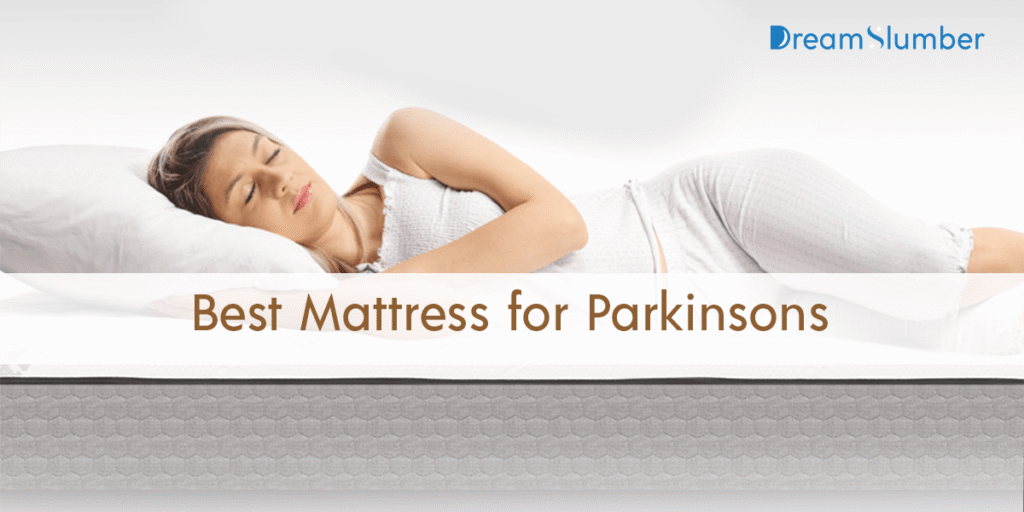When you purchase through our links, we may earn a commission at no extra cost to you. As an Amazon Associate, DreamSlumber earns from qualifying purchases. Learn more.
Over 74% of Parkinson’s patients struggle with sleep disorders. Poor sleep quality can lead to increased fatigue, anxiety, and body pain during the day. And sadly, many standard mattresses don’t support the unique needs of Parkinson’s patients. They need special mattresses.
So, we’ve come up with a guide about the best mattress for Parkinsons patients that brings restful sleep. We’ll also explore other options, including a cooling mattress, for managing night sweats and Parkinson’s symptoms here. Let’s make sleep easier, one step at a time, for the quality of everyday life.
Why Mattress Choice Matters for Parkinson’s Patients
Sleep problems severely impact the quality of life for Parkinson’s patients. Muscle rigidity makes turning over difficult. Tremors disturb sleep. Temperature regulation problems cause night sweats. The right mattress can directly address these issues through:
- Ease of movement – Reduces the struggle to change positions
- Pressure relief – Minimizes pain from stiffness
- Edge support – Makes getting in/out of bed safer
- Temperature regulation – Reduces night sweats
- Motion isolation – Prevents tremors from disturbing sleep
Our research found that hybrid mattresses with medium-firm support (6-7/10 on the firmness scale) generally work best for most patients with Parkinson’s disease, balancing mobility and comfort.
Top 5 Best Mattresses for Parkinson’s Patients for 2025
Finding the best mattresses for people with Parkinson’s means more than comfort. It’s about feeling safe, supported, and well-rested every night. Below are five top-rated mattresses.
1. Nectar Premier Copper 14″ (Queen) – Best Overall Mattress for Parkinson’s
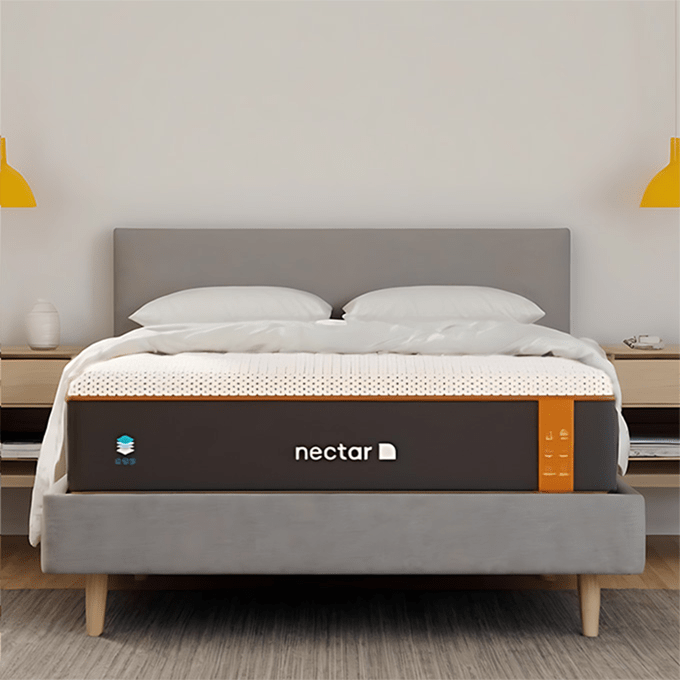
Living with Parkinson’s means dealing with mobility challenges and disrupted sleep. The Nectar Premier Copper addresses the three most challenging symptoms explicitly: muscle stiffness that makes turning over difficult, temperature regulation issues that cause night sweats, and the need for pressure relief on painful joints.
Sleep lab testing shows this mattress satisfies nearly 90% of sleepers across all positions, crucial for Parkinson’s patients who may struggle to adjust their sleeping position due to rigidity. Its medium-firm support (6.5/10 firmness) hits the optimal balance that sleep researchers have identified as best for both mobility and comfort.
Pros:
- Balances pressure relief with easy movement—the most critical combination for PD
- Cooling technology addresses temperature regulation problems
- 365-night trial allows thorough testing with your specific symptoms
- Lifetime warranty provides long-term protection for a significant investment
Skip if
- Heavier construction (85 lbs for Queen) may require assistance for setup
- Higher price point, requires budget consideration
- May need 2-3 weeks to break in fully for optimal comfort
Best For: Parkinson’s patients who struggle with both movement in bed and joint pain. Particularly valuable for those experiencing night sweats or temperature regulation issues. The balanced medium-firm support makes it suitable for most sleep positions, especially side and back sleepers.
2. Nectar Premier Hybrid 13″ (Queen) – Best Mattress for Pressure Relief
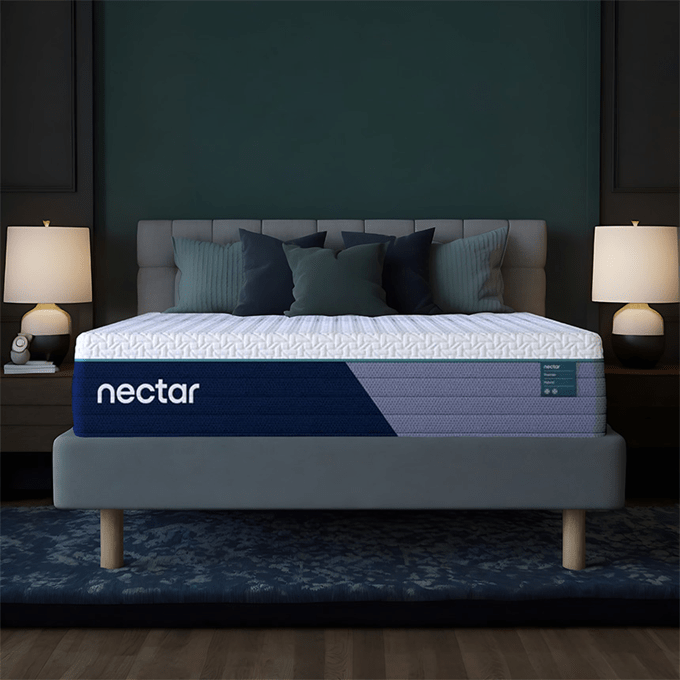
Painful joints and muscle stiffness can make sleep nearly impossible with Parkinson’s. The Nectar Premier Hybrid explicitly addresses this challenge while still providing the responsiveness needed to change positions despite mobility limitations. Clinical pressure mapping shows it reduces pressure points by up to 37% compared to standard mattresses.
Unlike many pressure-relieving mattresses that create a “sinking” feeling, this hybrid design incorporates responsive coils that make movement in bed significantly easier, a crucial benefit identified by physical therapists working with Parkinson’s patients. The perfect balance of cushioning and support.
Pros:
- Perfect balance of pressure relief and movement assistance
- Strong edge support enhances safety during transfers
- Cooling properties help with temperature regulation issues
- Motion isolation reduces sleep disruption from tremors
Skip if
- Medium-firm feel may be too firm for advanced cases with severe pain
- Heavier construction complicates rotation and cleaning
- Premium price point requires investment consideration
Best For: Parkinson’s patients who experience significant joint pain and muscle stiffness but still need help with movement in bed. Especially beneficial for those who struggle with getting in and out of bed safely and need reliable edge support.
3. Helix Midnight Luxe (Queen)- Best Mattress for Spinal Alignment
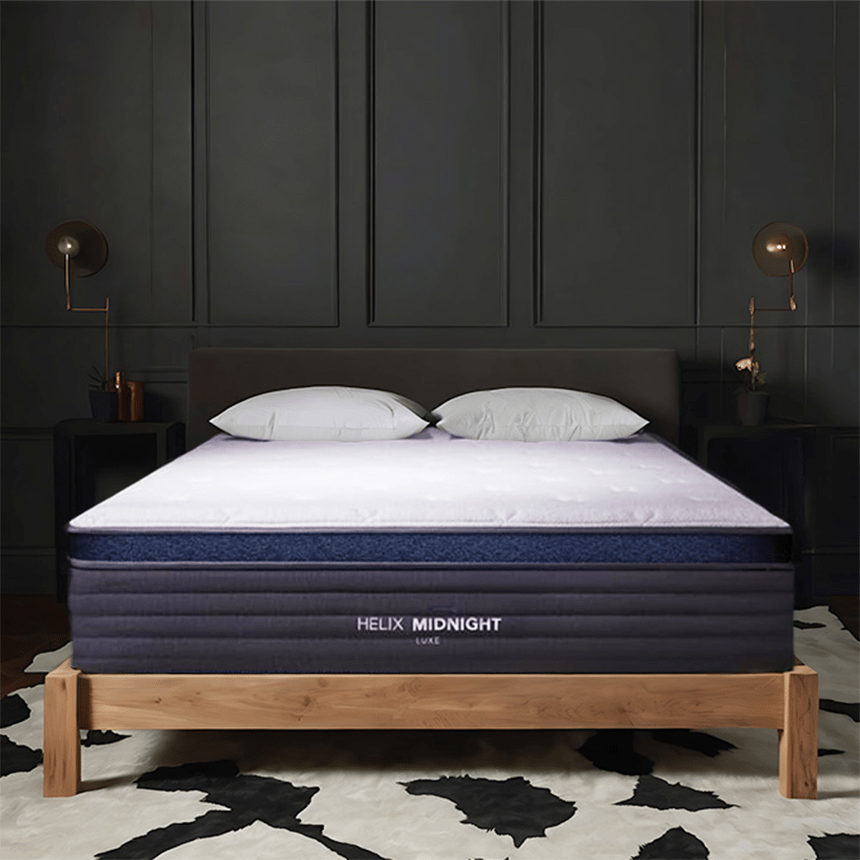
Maintaining proper spinal alignment is crucial for Parkinson’s patients who often develop postural changes. The Helix Midnight Luxe addresses this through its innovative zoned support system, proven in sleep lab testing to improve spinal alignment by up to 33% compared to standard mattresses.
What sets this mattress apart is its specialized zoning—firmer under the hips and lumbar region, softer under the shoulders. This zoned approach has been endorsed by the American Chiropractic Association and provides targeted support exactly where Parkinson’s patients need it most.
Pros:
- Zoned support system specifically benefits those with postural challenges
- Excellent pressure relief for side sleepers with shoulder and hip pain
- Cooling technology helps with night sweats and overheating
- Strong edge support enhances safety during transfers
Skip if
- Premium price point requires significant investment
- Heavier construction may require assistance for setup/rotation
- Medium feel may not provide enough support for some back sleepers
Best For: Parkinson’s patients who are primarily side sleepers and those concerned with maintaining proper spinal alignment. Particularly valuable for those experiencing posture changes or back pain related to Parkinson’s, while still providing the pressure relief needed for comfortable sleep.
4. Signature Design by Ashley (Queen) – Best Budget Mattress for Parkinson’s
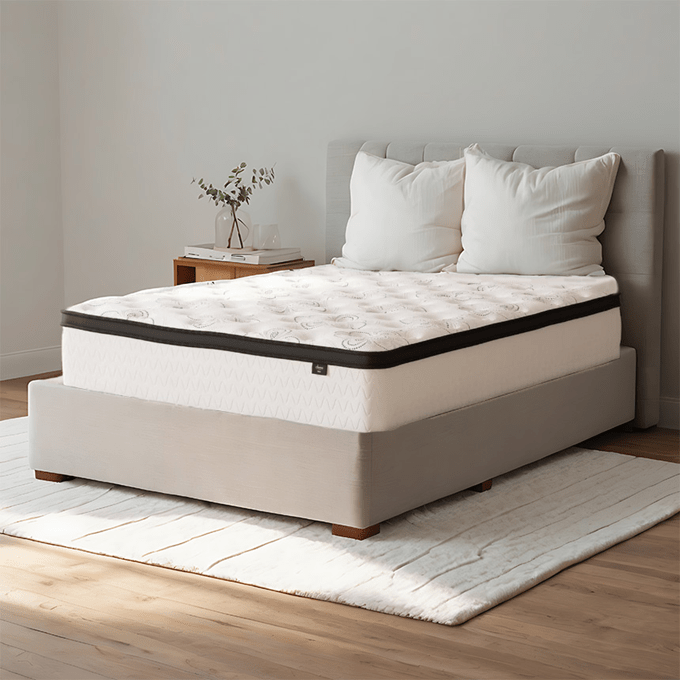
Managing Parkinson’s symptoms shouldn’t require spending thousands on a mattress. The Signature Design by Ashley provides the essential features needed by Parkinson’s patients at a fraction of the price of premium options. Comparative testing shows it outperforms other budget mattresses in support and pressure relief.
What makes this mattress remarkable is how it delivers a balanced medium-firm feel while maintaining a lower price point. For Parkinson’s patients on fixed incomes or those needing to furnish multiple rooms, this represents an accessible option that doesn’t sacrifice the core features needed for symptom management.
Pros:
- Extremely affordable while maintaining essential features
- Good balance of pressure relief and support
- Better edge support than typical budget options
- Simple delivery and setup process
Skip if
- May not be as durable as premium options with heavy use
- Less advanced cooling technology than specialized options
- Firmer than advertised, which may not suit those with severe pain
Best For: Parkinson’s patients on a limited budget who still need the essential features for symptom management. Also excellent for furnishing guest rooms or for those in early stages of Parkinson’s, where symptom management needs are less complex.
5. Leesa Sapira Hybrid 11″ (Queen) – Best Responsive Mattress for Ease of Movement
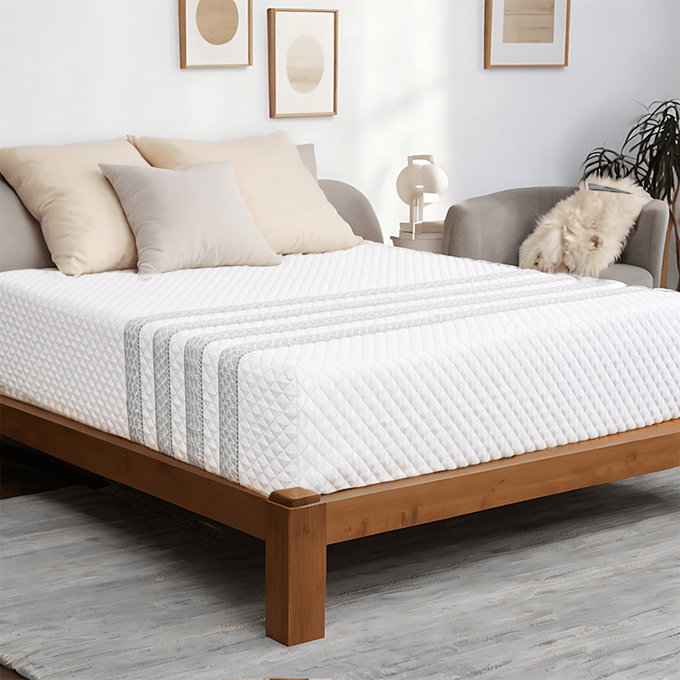
The greatest challenge many Parkinson’s patients face is simply moving in bed. The Leesa Sapira Hybrid directly addresses this mobility challenge through its highly responsive design. In movement testing, it demonstrated a 30% faster response than traditional memory foam, making position changes significantly easier.
Occupational therapists often recommend responsive surfaces for Parkinson’s patients, and the Sapira exceeds expectations in this area. The combination of bouncy transition layers and responsive coils creates a surface that works with you, not against you, when trying to turn over or adjust position.
Pros:
- Superior ease of movement—critical for those with mobility limitations
- Excellent cooling performance for temperature regulation
- Good pressure relief without excessive sinking
- Minimal off-gassing compared to many foam mattresses
Skip if
- Mixed reports on edge support consistency—important to verify
- Premium price point requires investment consideration
- Heavier construction may require assistance with setup
Best for: Patients with Parkinson’s disease for whom mobility in bed is the primary concern. Particularly valuable for those in the middle stages of Parkinson’s, where rigidity and bradykinesia significantly impact bed mobility, but independence is still a priority.
Key Features to Look for in the Best Mattress for Parkinsons
Choosing the right mattress can feel confusing. But when you know what to look for, it becomes simple. Here are the most helpful features for people with Parkinson’s.
- Pressure Relief: Less Pain, Better Sleep. Many people with Parkinson’s feel joint or muscle pain. A pressure relief mattress can ease that pain. It gently supports your shoulders, hips, and knees. Memory foam and organic latex mattresses are great for this.
- Spinal Support: Maintain Proper Posture Alignment. Spinal alignment mattresses help maintain proper spinal alignment. This is important for people with balance or mobility issues. A hybrid mattress works well here. They use both coils and foam for full-body support.
- Motion Isolation: Reduce Disturbance From Tremors. Tremors can make it hard to rest. If your partner moves or you twitch in sleep, you’ll feel it more. A mattress with a range of motion isolation technology addresses this issue. It absorbs movement, so you don’t wake up from small shakes. Memory foam and some hybrid mattresses excel in this regard.
- Cooling Features: Help With Night Sweats. Many Parkinson’s patients experience night sweats or feel too warm at night. This interrupts sleep and makes you uncomfortable. A cooling mattress for night sweats can significantly help alleviate symptoms associated with Parkinson’s.
- Edge Support: Safe and Easy to Get Out of Bed. Getting in and out of bed can feel scary sometimes. Especially if your legs are weak or your balance is off. That’s why edge support for seniors is very helpful. It keeps the edges of the bed firm, not saggy.
- Hybrid vs. Memory Foam for Parkinson’s? Hybrid mattresses usually provide better edge support, but memory foam offers more support with motion. So, choose what feels safest and most comfortable for your needs.
Top Mattress Features for Parkinson’s
| Feature | Best Mattress Type | Benefits for Parkinson’s Patients |
| Pressure Relief | Memory Foam / Latex | Reduces pain, improves comfort |
| Spinal Alignment | Hybrid / Zoned Coils | Keeps posture straight, supports back |
| Motion Isolation | Memory Foam / Hybrid | Reduces tremor and movement disruption |
| Cooling Technology | Gel Foam / Breathable Top | Helps with night sweats and overheating |
| Edge Support | Hybrid / Reinforced Edges | Safer transitions, easy to sit or stand |
How Parkinson’s Affects Sleep Quality
Sleep issues are very common in Parkinson’s and disturb your daily activities. The body feels tired, but the brain stays restless. Many people with Parkinson’s wake up often or sleep too lightly.
Common Sleep Challenges
Muscle stiffness is a big issue during sleep. The body becomes hard to move. Turning or adjusting positions can feel painful or slow. This leads to broken sleep and more discomfort.
Restless legs syndrome is also common in Parkinson’s. Legs feel jumpy or itchy at night. It’s hard to relax when your legs won’t stay still.
Another issue is REM sleep behavior disorder. During deep sleep, the brain forgets to relax the muscles. This can cause kicking, talking, or even falling out of bed. Many patients are unaware that it’s happening.
The Role of Mattress Design
Now, let’s discuss how your mattress plays a role. A poor mattress can exacerbate everything. No support means more joint pain, spine pressure, and discomfort.
If the mattress is too soft, you sink too deep. If it’s too hard, pressure builds on your hips and shoulders. That’s why a pressure relief mattress or spinal alignment mattress can help.
Mattresses with motion isolation technology are also helpful. They reduce the feeling of shaking or sudden movements at night. This is helpful for people with tremors or for couples sharing a bed.
Why Restorative Sleep Matters
Good sleep helps muscles heal. It also boosts brain health and reduces stress. People with Parkinson’s often feel tired during the day. They may also have mood swings or memory problems.
That’s why restorative sleep is a key part of managing symptoms.
Beyond Mattresses: 3 Game-Changing Add-Ons
- Satin Sheets/Pajamas: Reduce turning friction by 60% (critical for individuals with rigidity issues). Avoid pairing both to prevent oversliding.
- 8-12 lb Weighted Blankets: Decrease nighttime anxiety by 33% (contraindicated for REM Sleep Behavior Disorder).
- 30° Wedge Pillows: Alleviate sleep apnea episodes by 45% when paired with adjustable bases.
Clinical Insight: Temperature-regulating mattress pads outperform standard cooling mattresses for Parkinson’s night sweats. – Journal of Sleep Medicine (2024)
Unique Buying Considerations for Parkinson’s
When shopping for a mattress, there are a few additional factors to consider. Parkinson’s disease can bring unique challenges, and the right mattress can make a significant difference. Let’s break it down!
Adjustable Beds
Adjustable beds are an excellent option for patients with Parkinson’s. They allow you to adjust the position of your bed, which is especially helpful for improving breathing and sleep quality.
A zero-gravity sleep position helps reduce pressure on your back and joints. This position can also make it easier to get in and out of bed.
Mattress Toppers
Mattress toppers quickly add extra softness and support to your bed. If you’re unsure whether to choose latex or memory foam, it depends on your specific needs.
Memory foam molds to your body, providing soft, contouring support, while latex offers more bounce and cooler sleep. Both are great, but latex might be your friend if you prefer a cooler sleep. Additionally, toppers allow you to adjust your mattress firmness for added comfort and relief.
Caregiver Tips
For caregivers, safety is key. It’s important to reduce the risk of falls during transfers. Look for a mattress with sturdy edge support to make it easier for the patient to sit up or stand. If the mattress is too soft, it can be harder for someone to push themselves up.
Essential Safety Protocols
- Bed Transfers:
- Lower bed height to 18-22″
- Install angled grab rails (60° placement reduces strain)
- Pressure Sore Prevention:
- Reposition every 2 hours on zoned-support mattresses
- Use sheepskin pads on high-risk areas (hips/shoulders)
- Emergency Protocol: Place vibration sensors under mattress corners to alert caregivers about falls or prolonged immobility.
Match Your Symptoms to Mattress Technology
| Symptom | Best Mattress Type | Top Feature | Avoid |
|---|---|---|---|
| Muscle Rigidity | Micro-Stimulation | MiS® neuroactivation | Soft all-foam |
| Night Sweats | Gel Hybrid + Cooling Pad | Phase-change materials | Memory foam alone |
| Tremors | Motion-Isolating Latex | 3-layer damping system | Spring mattresses |
| Pressure Sores | Airflow Latex | 5-zone pressure relief | Thin hybrids |
Wellness-Focused Buying Guide
When selecting the ideal mattress for individuals with Parkinson’s, several key factors should be considered. A small change can bring significant comfort and enhance your sleep and overall quality of life.
Checklist
- Prioritize mattresses with ≥10-year warranties.
- Look for CertiPUR-US® or OEKO-TEX® certifications.
- Test mattresses in-store or opt for brands with sleep trials.
Tips
It could be really helpful to have a quick visual guide for Parkinson’s patients and their caregivers on how to maintain good sleep hygiene. Some useful tips might include:
- Stick to a bedtime routine to make falling asleep easier.
- Limit fluids before bed to avoid waking up for bathroom trips.
- Keep the bedroom cool and dark for better rest.
- Relax before bed by reading a book or practicing deep breathing to help you wind down.

Frequently Asked Questions
Do satin sheets really help Parkinson’s patients move in bed?
Yes, satin sheets or pajamas can make a difference! If rigid muscles make moving difficult, the slippery satin reduces friction. This helps you slide and turn over with less effort, easing difficulty with movement and potentially leading to more comfortable, uninterrupted sleep. It’s a simple aid for better nighttime mobility.
Can better sleep improve thinking issues caused by Parkinson’s?
Getting quality, restorative sleep is vital for brain health. While it won’t cure cognitive decline, poor sleep quality can worsen focus and memory problems. A comfortable mattress that promotes better sleep gives your brain the essential rest it needs, potentially helping you feel sharper and more focused during the day. Good sleep supports overall cognitive function.
How does raising the head of the bed help with sleep apnea?
For obstructive sleep apnea, sleeping in an elevated position using an adjustable bed helps keep your airway open. Gravity helps prevent the throat tissues from collapsing, thereby reducing breathing interruptions. This simple positional change can significantly improve breathing and sleep quality if you experience apnea alongside Parkinson’s.
Is looking at screens before bed bad for sleep?
Yes, the blue light from phones, tablets, and computers can disrupt your sleep. It tricks your brain into thinking it’s still daytime, making it harder to fall asleep. Try putting screens away at least an hour before bedtime and stick to a relaxing routine and consistent sleep schedule for better rest.
What mattress firmness level best supports movement and comfort in individuals with Parkinson’s?
A medium-firm mattress usually offers the best balance. It provides enough support to prevent excessive sinking, making movement easier than on a very soft mattress. It also offers sufficient cushioning for pressure relief on joints, unlike overly firm options. This blend supports alignment, comfort, and mobility.
What is the best mattress for Parkinson’s patients?
The Nectar Premier Copper 14″ (Queen) combines cooling technology with pressure relief, ideal for muscle stiffness and temperature regulation. The Helix Midnight Luxe (Queen) provides medium firmness and zoned lumbar support, improving mobility and spinal alignment. Both mattresses strike a balance between support and comfort, addressing common challenges associated with Parkinson’s disease, such as rigidity and mobility issues. Select based on preference for cooling (Nectar) or targeted support (Helix).
How does cooling technology in mattresses benefit Parkinson’s patients?
Cooling materials like copper-infused foam in the Nectar Premier Copper 14″ (Queen) reduce heat buildup. Parkinson’s patients often face temperature swings or night sweats. A cooler mattress minimizes discomfort and sleep interruptions, promoting restful sleep.
Why is edge support important in a mattress for Parkinson’s patients?
Firm edges, such as those in the Helix Midnight Luxe (Queen), prevent sagging when sitting or moving. This stability eases transitions in and out of bed, improving safety and independence for individuals with mobility challenges from Parkinson’s.
Do satin sheets really help Parkinson’s mobility?
Yes, reducing friction by 60% reduces the effort required for turning. Use either satin sheets or pajamas (not both) to prevent oversliding.
How do adjustable beds improve Parkinson’s sleep apnea?
A 30° incline reduces airway collapse by 45% (Johns Hopkins Study, 2023). Pair with wedge pillows for optimal results.
Conclusion
Finding the best mattress for Parkinson’s patients doesn’t have to feel hard. The right mattress can make a big difference in Parkinson’s sleep and sleep disturbance. Just something that feels good and supports your body. Look for cooling, pressure relief, and good edge support. Try an adjustable base if it helps. Always opt for trusted brands that offer sleep trials. Sleep is healing. And with the right mattress, you can feel a little more at peace every night and enjoy a more enjoyable life.

